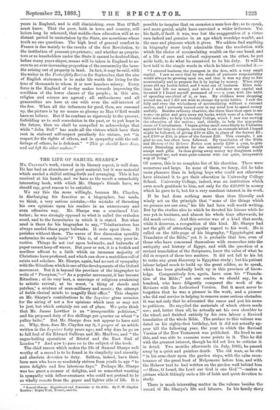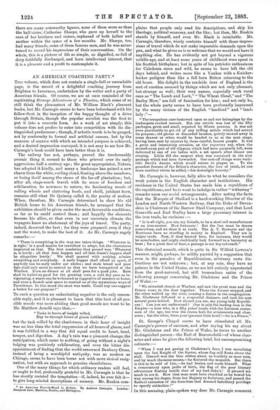THE LIFE OF SAMUEL SHARPE.* MR. CLAYDEN'S work, viewed in
its literary aspect, is well done. He has had an abundance of good material, but it was material which needed a skilful setting-forth and arranging. This it has received at his hands, and we have as the result a remarkably interesting book, with which Mr. Sharpe's friends have, we should say, good reason to be satisfied.
We say this the more willingly, because Mr. Clayden, in discharging his function as a biographer, has made, we think, a very serious mistake,—the mistake of thrusting his own opinions upon his readers in an unnecessary and even offensive way. Mr. Sharpe was a convinced Uni- tarian; he was strongly opposed to what is called the orthodox creed, and to the formularies in which it is stated. But what need is there for his biographer to say, " Trinitarianism has always needed these paper bulwarks. It rests upon them. It perishes without them. The waves of free discussion speedily undermine its sandy basis"? This is, of course, very poor in- vective. Things do not Pest upon bulwarks, and bulwarks of paper cannot keep off waves. But poor or not, it is a foolish and needless affront to a faith which an immense majority of Christians have professed, and which can show a matchless roll of saints and scholars. Mr. Sharpe, again, had no sort of sympathy with the Ritualism which is one of the developments of the Oxford movement. But it is beyond the province of the biographer to write of" Puseyism,"—" As a popular movement, it has become Ritualism ; at its very best, a marriage of religious awakening to artistic revival ; at its worst, 'a thing of shreds and patches,' a mixture of man-millinery and music ; the attempt of feeble clerical minds to magnify their office." This chapter on Mr. Sharpe's contributions to the Inquirer gives occasion for the airing of not a few opinions which may or may not be just, but which certainly are out of place. We quite think that Mr. James Lowther is an "irresponsible politician," and his proposed duty of five shillings per quarter on wheat " a paltry bribe." But Mr. Sharpe does not appear to have said so. Why, then, does Mr. Clayden say it, et propos of an article written in the Iaquirer forty years ago ; and why does he go on to fall foul of Sir Edward Sullivan and Mr. MacIver, and "the sugar-boiling operatives of Bristol and the East End of London "P And now to pass on to the subject of the book.
The chief reason which makes the life of Samuel Sharpe well worthy of a record is to be found in its simplicity and sincerity and absolute devotion to duty. Seldom, indeed, have there been men who have so resolutely striven from youth to age "to scorn delights and live laborious days." Perhaps Mr. Sharpe was too great a scorner of delights, and so somewhat wanting in sympathy with fellow-creatures who could not pretend to be so wholly remote from the gayer and lighter side of life. It is
• &mug Sharpe: Egyptologist and Trantlator of the Belle. Bs P. W. Clayden London ; Segall P.inl, Trencb, and Co.
possible to imagine that on occasion a man less dry, so to speak, and more genial, might have exercised a wider influence. Yet his fanit,,if fault it was, was but the exaggeration of a virtue rare indeed and genuine in an age which worships wealth, and the ease and pleasure which it gives. We seldom find anything in biography more truly admirable than the resolution with which the choice of accumulating wealth on the one hand, and of a life of ease and refined enjoyment on the other, he put aside both, to do what he conceived to be his duty. It will be best told in the simple words in which he himself recorded it :—
" I entered business, the youngest in the firm, with a very small capital. I saw at once that by the death of partners responsibility would always be growing upon me, and that it was my duty to live economically and to prepare for it by laying by money. When sixty years old my health failed, and I went out of business. Elder rela- tions bad left me money, and when I withdrew my capital and invested it I found myself possessed of — a year, with the habit. ofspending one-third of it, or less. My children were dropping around me, and I did not wish to change my quiet habits. I saw the folly and even the wickedness of accumulating without a rational motive, and I seriously turned over in my mind how to spend money usefully. Besides ordinary charities, the three lines then open to me were,—to print and give away my books, which were of a class very little saleable ; to help University College, which I saw was moving the education of the nation ; and, thirdly, to help the unpopular cause of Unitarianism. I began giving small sums freely to Unitarian appeals for help to chapels, meaning to set an example which I hoped might be followed, of giving 210 or 220, in place of the former £5, and £100 or £50, in place of the former £20. This example, I am glad to see, has often been followed. My translation of the Bible and History of the Hebrew Nation cost nearly £200 a year, to give every Dissenting student for the ministry whose college would accept such gifts. In thus giving away money my daughters nobly encouraged me, and were quite content with our quiet, inexpensive way of living."
Of course, this is no complete list of his charities. These were numerous and large. In none of them, we fancy, did he take more pleasure than in helping boys who could not otherwise have obtained it to get their education in University College School. University College, indeed, was an institution which owes much gratitude to him, not only for the £20,000 in money which he gave to it, but for a very constant interest in its work. If he had done nothing more than thus liberally and wisely act on the principle that "none of the things which we possess are our own," his life had been well worth writing. But by the studies also to which he devoted his leisure while he was yet in business, and almost his whole time afterwards, he did much service. And this service was of a kind that needs, while it deserves, a recognition of this kind. Mr. Sharpe had not the gift of attracting popular regard to his work. He is called on the title-page of his biography, "Egyptologist and Translator of the Bible," yet it is probable that few, even of those who have concerned themselves with researches into the antiquity and history of Egypt, and with the question of a revised translation of the Scriptures, know the value of what he did in respect of these two matters. It did not fall to his lot to make any great discovery in Egyptian study ; but his patient labour helped much to build up the great edifice, so to speak, which has been gradually built up in this province of know- ledge. Comparatively few, again, have seen his "Transla- tion of the Bible;" not one reader, we should say, for a hundred, who have diligently compared the work of the Revisers with the Authorised Version. But it must never be forgotten that he was a pioneer in the work, and a pioneer who did real service in helping to remove some serious obstacles. It was not only that he advocated the cause and put hie name to petitions. He supplied the materials of which others made use ; and, better than all, he actually set his own shoulder to the wheel, and finished entirely by his own labour a Revised translation of the whole Bible. The preface to this volume was dated on his eighty-first birthday, but it did not actually ap- pear till the following year, the year in which the Revised Version of the New Testament was published. He lived to see this, and was able to examine some points in it. This he did with the greatest interest, though he did not live to criticise it in detaiL Two months afterwards (in July, 1881), he passed away by a quiet and painless death. The, old man, as he sits "in his arm-chair upon the garden steps, with the calm coun- tenance of the great bust of Melpomene before him, and with the Hebrew text he had written on the garden wall behind him —.Hear, 0 Israel, the Lord our God is one God "—makes a picture which fittingly ends a life of faith and quiet devotion to study.
There is much interesting matter in the volume besides the record of Mr. Sharpe's life and labours. In his family dory there are many noteworthy figures, none of them more so than the half-sister, Catherine Sharpe, who gave up herself to the care of her brothers and sisters, orphaned of both gather and mother within the space of a few months. Mr. Sharpe, too, had many friends, some of them famous men, and he was accus- tomed to record his impressions of their conversation. On the whole, this is a picture of life so simple, so dignified, so full of duty faithfully discharged, and keen intellectual interest, that it is a pleasure and a profit to contemplate it.



































 Previous page
Previous page